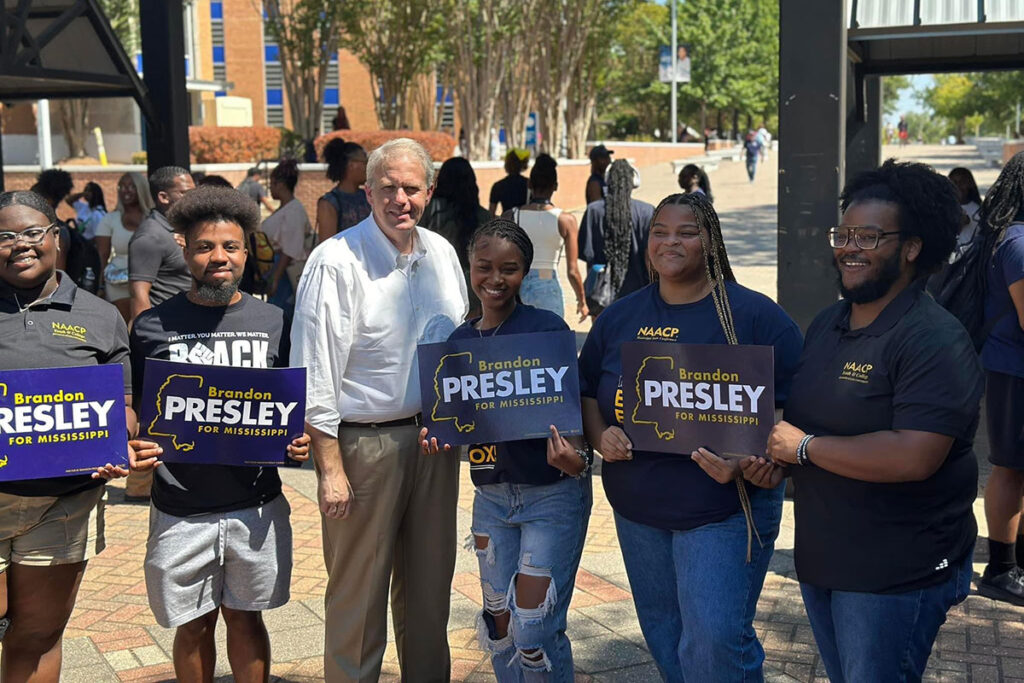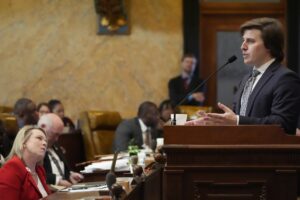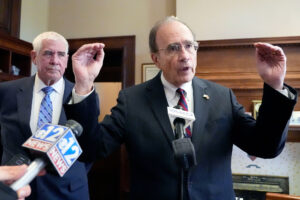JACKSON, Miss.—In early October, Mississippi Democratic candidate for governor Brandon Presley crisscrossed Jackson, shaking hands and taking selfies as he courted residents in the nearly 83%-Black capital city. He needed Jacksonians to vote if he was to have any chance of defeating incumbent Republican Gov. Tate Reeves on Nov. 7, he told supporters.
“Tate Reeves and that bunch he runs around with at the governor’s mansion—they have it in their minds that folks are not going to vote … (that) particularly the Blacks will not show up and vote,” Presley told a crowd at CWA Union Hall on Oct. 6. “That’s what they think. Are we going to prove them wrong?”
Supporters yelled back affirmatively.
Before the rally that evening, the white Democratic nominee had visited with a crowd at Refill Jackson on Robert Smith Parkway near Jackson State University in the morning; spoke with talk-show host Othor Cain in the studio for local gospel and blues radio station WMPM 90.1; and had lunch with Black Women for Brandon Presley organizers at Johnny T’s Bistro & Blues in the Farish Street Historic District.
Several residents who attended events that day told the Mississippi Free Press that his campaign promises resonated with them. City of Jackson Continent Service Manager Chris Gray said she was excited that Brandon Presley promised to treat Jackson as Mississippi’s capital city—betraying a long-held belief among residents that the state’s white leaders have too often looked down on Jackson.
Nearby Madison resident Tommy Hairston, a voter who attended two Presley events in Jackson, told the Mississippi Free Press he hopes “the next governor can help resolve the (Jackson) water crisis and (expand) Medicaid to let hospitals flourish.”
“We need more jobs and a governor to represent all Mississippians regardless of race or party affiliation,” he added. Other voters also echoed the call for Medicaid expansion, including Vickie Jenkins, who is retired from the Mississippi Department of Corrections. Monica Stewart Wilson, a member of Women for Progress, said the policy “will help small and large businesses and, of course, hospitals.” Byram resident Cordelia Gilbert Aaron, a campaign volunteer leader, told the Mississippi Free Press she liked Presley’s “passion” before repeating a common refrain among his supporters: “Later Tater.”
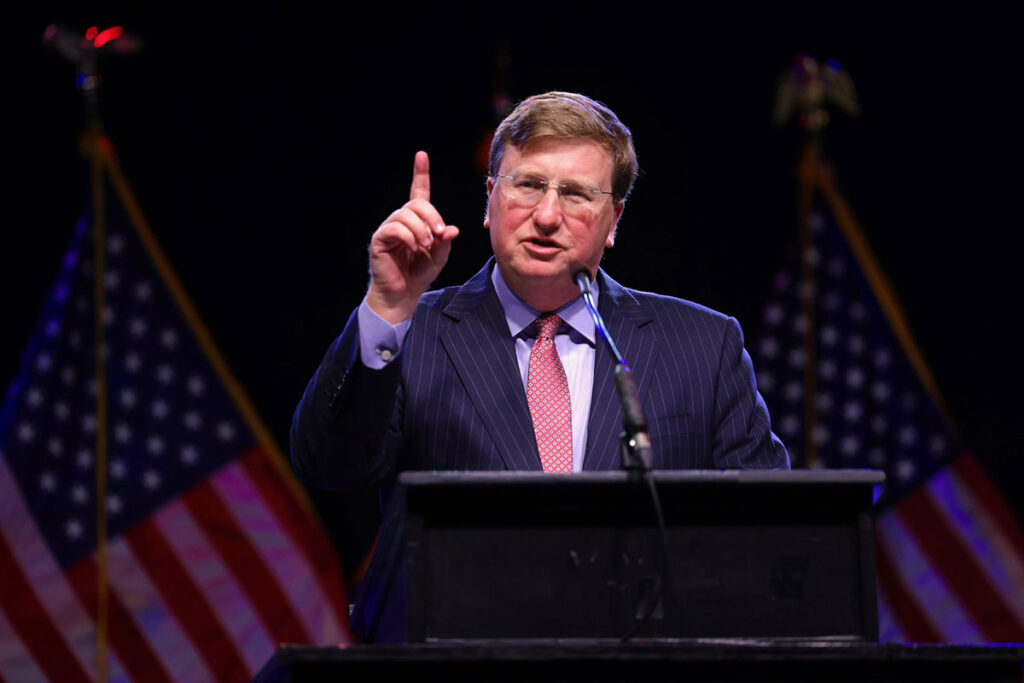
Presley has long promised to expand Medicaid, which he says would bring coverage to about 230,000 working Mississippians who make too much for traditional Medicaid but not enough to afford commercial insurance or qualify for federal health-care subsidies. Reeves has long refused to accept $1 billion in yearly federal funds for expansion, though. At the debate on Nov. 1, he warned that “the unintended consequence of expanding Medicaid to 300,000 Mississippians is moving individuals off of private insurance.”
Days after the Oct. 6 visit, Presley attended a football game at Alcorn University, a historically Black land-grant university near Lorman, Miss., and attended Jackson State University’s homecoming game on Oct. 14. On Oct. 9, he also participated in an NAACP candidates forum in Gulfport, Miss; Reeves declined to attend.
The Democratic candidate has made more visits to Jackson since, including on Nov. 5, when he held a rally outside Stronger Hope Church. In the past, white candidates running for statewide office in Mississippi have focused more on turning moderate and conservative white voters who have left the party in recent decades.
Hood Focused on White Moderates
In 2019, four-term Democratic Mississippi Attorney General Jim Hood lost the election for governor to Tate Reeves by five points after spending much of his campaign focused on winning over white independents and moderate Republicans. Despite being the last Democratic statewide elected official, Hood had previously been able to win over white voters in northeast Mississippi by pointing to his tough prosecutorial record, anti-abortion policies and opposition to gun legislation.
Hood campaigned on some issues liberals and progressives often champion, such as expanding Medicaid. But he avoided its association with former President Barack Obama, who made expansion possible when he signed the Patient Protection and Affordable Care Act into law in 2010.
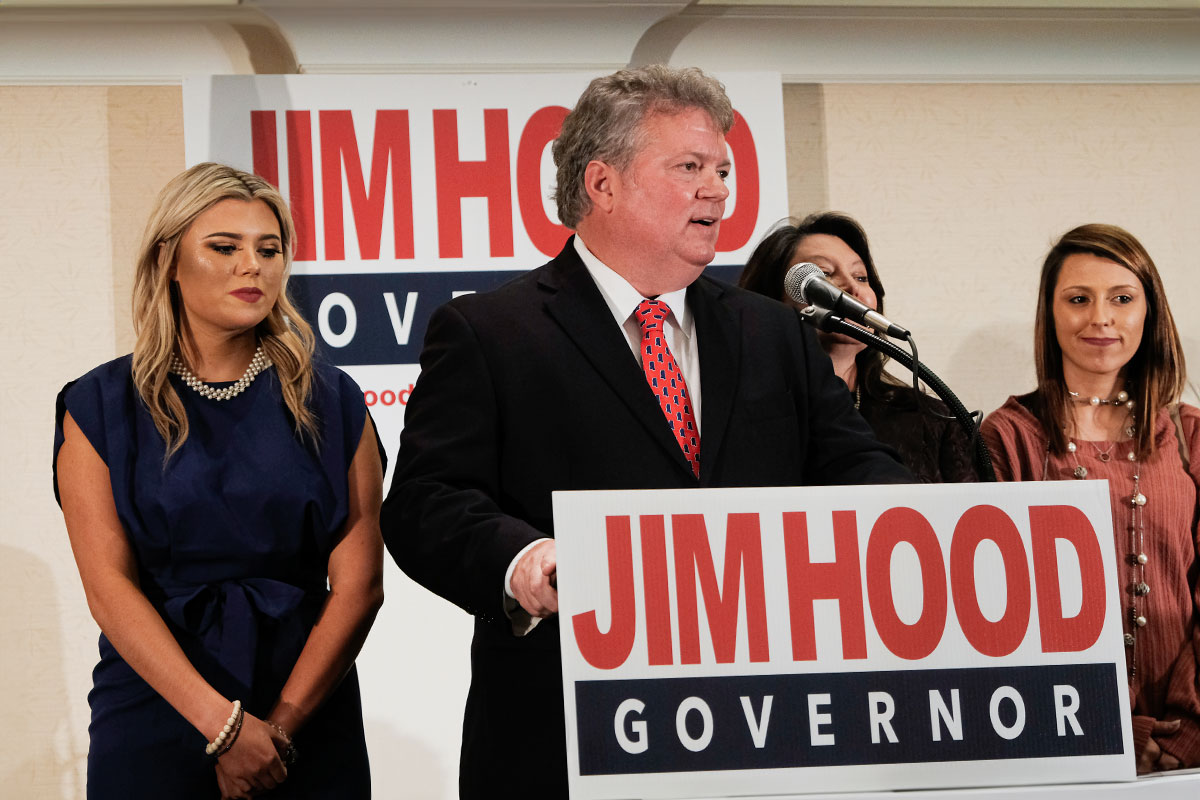
That choice did not stop Reeves’ campaigning from tying Hood to Obama and other national Democrats in his campaign materials, though, as he had done to his Republican primary opponent Bill Waller earlier that year. The Republican campaign branded both Hood’s and Waller’s support for Medicaid expansion as an endorsement of “Obamacare expansion.”
Hood had spent the campaign avoiding associations with the nation’s first Black president when, in its final hours, robocalls targeting Black voters that featured a recording of Obama asking them to vote for the Democratic nominee made the rounds. “Now we finally know what he really believes. Vote Republican tomorrow and end this once and for all,” then-Republican Gov. Phil Bryant tweeted the night before the election.
On Election Day, Hood lost all but two counties in northeast Mississippi and underperformed in majority-Black counties relative to Democratic U.S. Senate candidate Mike Espy’s campaign the year before. The white Democratic Party chairman at the time, Bobby Moak, blamed the party’s failure to elect a governor and the loss of its only statewide office on “nationalized” state politics. Not only had Reeves invoked the specter of Democrats like Obama and then-U.S. House Speaker Nancy Pelosi, but he had brought in then-President Donald Trump to support his campaign—strategies he’s repeating in 2023.
In an op-ed published in the Jackson Free Press several days after the election, Jennifer Riley-Collins, a Black woman who ran to succeed Hood as attorney general in 2019 but lost to Republican Lynn Fitch, blamed the party’s leadership for not doing more to stoke enthusiasm among Black voters.
“Guess what, Mr. Chairman, this race was ‘nationalized’ before it got started. Did you think Donald Trump was not going to come? It worked for them before, so why would they not do it again?” she wrote. “So pray tell, why would you reject national support like Stacey Abrams or wait to roll out President Obama only at the last minute?”
Presley Spent $2.5 Million on Black Voter Outreach
During Brandon Presley’s 2023 campaign for governor, he has accepted support from prominent Black Mississippians, including movie star Morgan Freeman and U.S. House Rep. Bennie Thompson—who led the congressional investigation into former President Donald Trump and the Jan. 6 attack on the U.S. Capitol.
As with Hood, the Reeves campaign and the Mississippi GOP have sent out mailers focused on tying him to national Democratic figures and causes. Some of those have falsely claimed that Presley supports gender-affirming surgeries for minors. In fact, the Democratic nominee has repeatedly said he opposed such surgeries and would not support repealing a recent law banning all surgical and nonsurgical gender-affirming care for minors, putting him at odds with some LGBTQ+-rights supporters in the state.
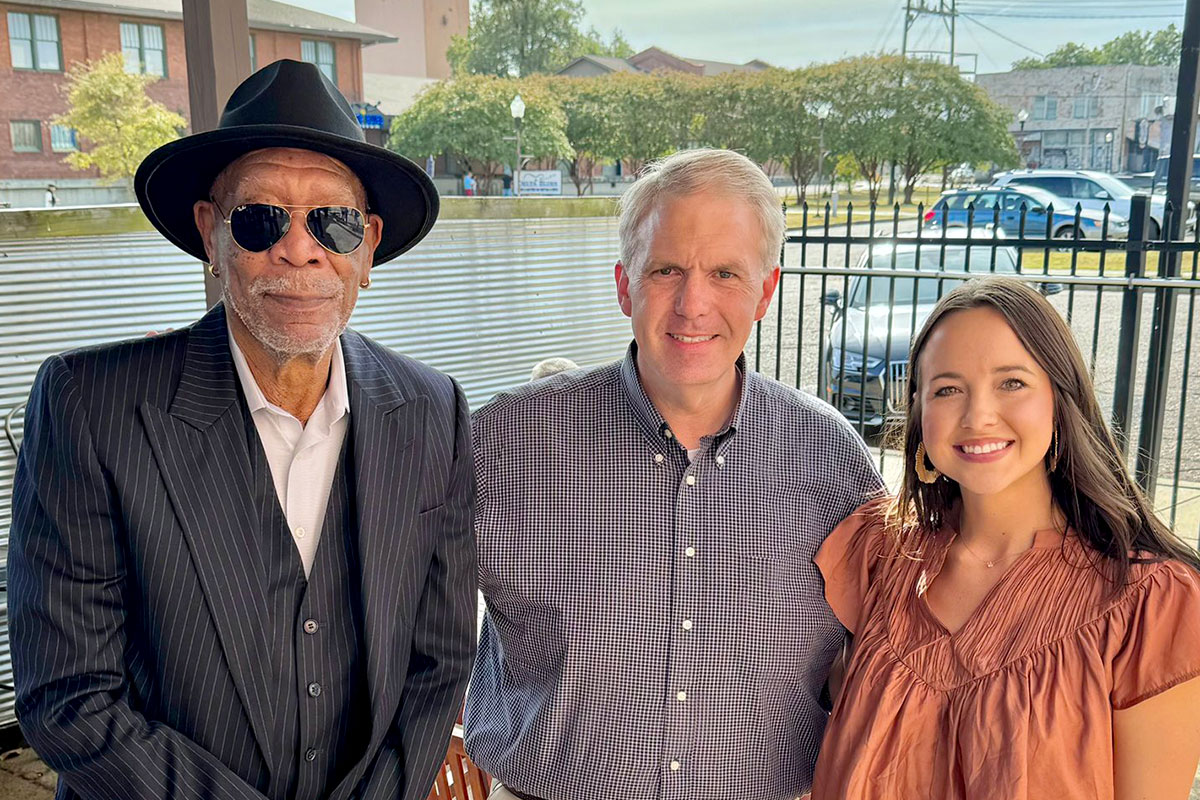
Other mailers that Republicans have sent out to mostly white voters feature images of Presley next to Thompson, former President Obama, President Joe Biden and Stacey Abrams, who is Black and ran for governor of Georgia unsuccessfully in 2018 and again in 2022.
The Daily Journal reported in late October that Presley said turning out Black voters was a key part of his electoral strategy and that his campaign had spent $2.5 million on Black-voter turnout. “This is going to result in the largest Black turnout in the state’s history,” he told the newspaper.
Reeves Touts Support From Black Leaders
Despite signing the bill that changed Mississippi’s old Confederate-themed state flag in 2020, Gov. Tate Reeves has repeatedly drawn criticisms from Black officials for his stances and policies. He has repeatedly declared April as Confederate Heritage Month and claimed on Fox News that “there is not systemic racism in America.” Still, Reeves’ campaign has sought some support from some Black leaders this year.
In a tweet on Oct. 12, Reeves tweeted that he “was glad to meet with leaders in the African American community on the Coast … to discuss the progress we’ve made in the last four years and the work to come.”
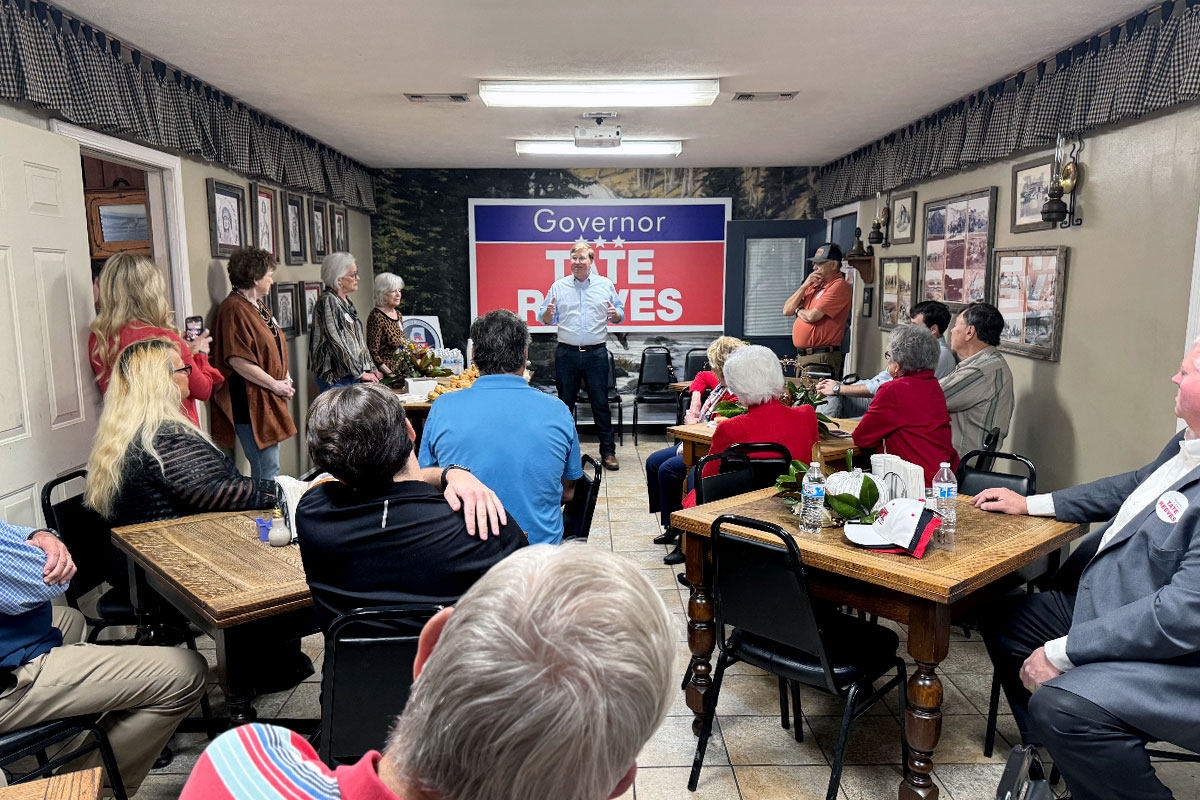
On Oct. 27, Mississippi Sen. Angela Cockerham, a Black independent who left the Democratic Party in 2019, endorsed Reeves in a campaign ad. “Tate Reeves and I, we disagree on plenty. … I’ve seen this governor solve complicated problems, that’s why I’m voting for Tate Reeves,” she said in the ad, citing his record on jobs, his decision to sign a teacher pay raise into law and his recently announced plan to help struggling rural hospitals.
‘I Wasn’t Supposed To Be Here’
At the CWA Union Hall in Jackson on Oct. 6, Presley reminded the audience of how Gov. Reeves had visited Hattiesburg, Miss., during Jackson’s 2022 water crisis and declared that “it’s a great day not to be in Jackson.”
Presley Jackson Field Organizer Patty Patterson told the Mississippi Free Press on Oct. 7, 2023, that she was working to help Presley win “for Mississippians who have been left behind.”
“We’re knocking on doors, talking to citizens, and increasing campaign signage,” she said. Patterson, who ran unsuccessfully for Mississippi House District 69 in the 2023 primaries, said she is familiar with local citizens and get-out-the-vote strategies. Tamarra Butler-Washington defeated her in the August primary and in January will replace retiring House Rep. Alyce Clarke, who has served for 40 years after becoming the first Black woman elected to the body in 1983.
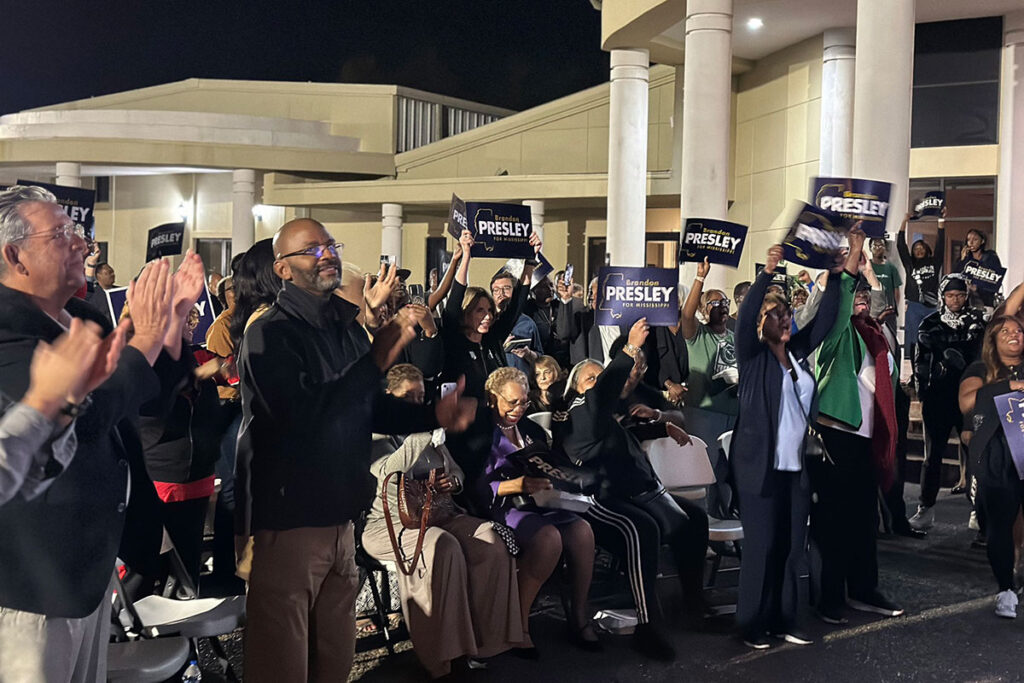
Presley thanked supporters and volunteers in the Jackson metropolitan area on Oct. 6.
“I’ll never forget the work that you do to help me. I’ll never forget the neighborhood you walk, the phone calls you make, the work you put in,” the candidate, who counts Elvis Presley as a second cousin, said. “I am a human among humans. I am one person. It’s an army of people that we have building, like people in this room, around this state that are going out doing the work.”
Presley emphasized his roots growing up poor in Nettleton, Miss., where his mother raised him after the murder of his father when he was in third grade. Voters elected him to serve as mayor of Nettleton from 2001 until 2007, when he won office as a public service commissioner for Mississippi’s northern district; he has held that office ever since.
“I wasn’t supposed to be here,” Presley said.
Voters will choose between Reeves and Presley in the statewide elections on Tuesday, Nov. 7. Independent candidate Gwendolyn Gray formally asked to withdraw from the race last month and endorsed Presley, but she remains on the ballot.
In addition to voting for governor, Mississippians will vote for all other statewide, legislative and regional offices on Nov. 7, 2023. Any eligible registered voter who registered in person by Oct. 9 or had their voter registration application postmarked by Oct. 10 can cast a ballot in the general election.
Polls are open from 7 a.m. to 7 p.m. Contact your local circuit clerk or election commissioners for polling place information. Voters must bring an accepted form of voter ID to the polls. For more information, visit sos.ms.gov/yall-vote.
Ashton Pittman contributed to this report.


